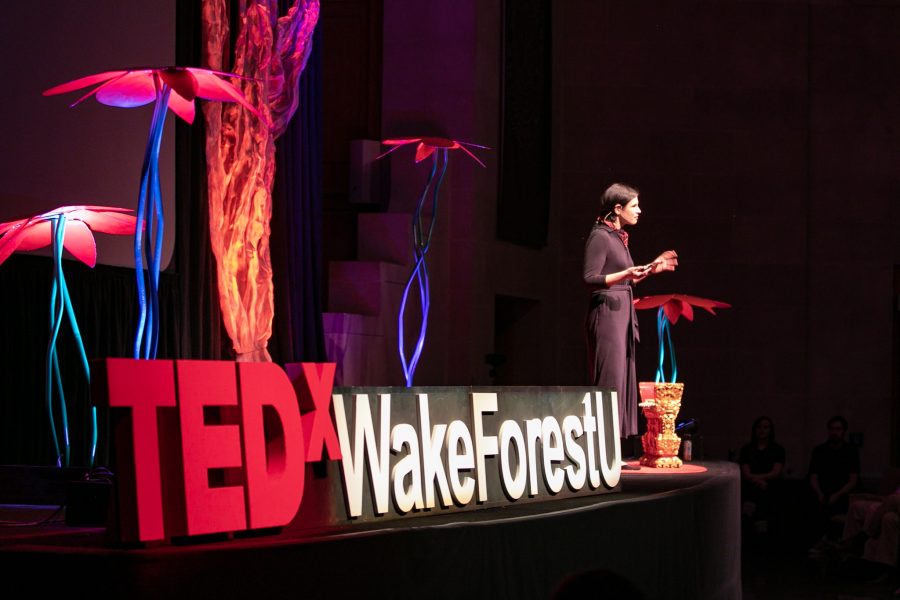At the TEDx event last Saturday, a blue- and red-hued Wait Chapel came to life with large flowers and tree projections popping out from the stage to match this year’s theme and title: “Metamorphic: What Will You Become?” TEDx WFU, one of three student-run TEDx conferences in the nation, hosted eight vastly different speakers to give presentations centered around the common theme of change.
After last year’s business-oriented talks, the student organizers of the event wanted to bring forth a broader theme that would attract a more diverse audience base.
“I think we were focused a little bit more this year on niche topics, but it really benefited the conference as a whole because we also had a lot of unique audience members which was really cool,” said sophomore Zoe Walling, the director of marketing for the event.
In order to attract a more unique audience, the team selected a motley crew of speakers to give 18-minute presentations. Derrick Day, a former senior special agent with the U.S. Secret Service, kicked off the event. Among other attendees, a group of computer science students joined the audience to listen to him speak about the dark web and cybersecurity.
Through a series of examples, Day shined a light on the dark web and demonstrated how it could be implemented in both useful and dangerous ways. He explained that the dark web was originally created for naval use because the government wanted more ways to communicate in private, but nowadays anyone can utilize it to buy prescriptions, guns or even hitmen.
“Knowing the dangers of the dark web had me thinking deeper about the pros and cons of technology,” said junior Jordan Smith.
Lorraine Gudas, chairman of Weill Cornell Medical College of Cornell University, was the next to stand on the classic TEDx red-dotted stage. The professor and researcher emphasized female-empowerment in the scientific world and detailed her research on cancer-preventive uses of Vitamin A, as well as therapeutic uses of stem cells and drugs to treat prostate and kidney cancers.
The event was followed by a more local speaker: Jim Otteson, Wake Forest’s presidential chair for Business Ethics and executive director of the Eudaimonia Institute. The emphasis of his talk was on maintaining honorable businesses and practices within them. He further dispelled the negative connotations surrounding business and the financial world, including how it does not have to only involve money and scheming.
Another unique audience group of Wake Forest yoga students were drawn to Wait Chapel to see Michelle Johnson, a yogi, activist, author and social change influencer. Johnson spoke about her story of fighting white supremacy with the help of yoga. She explained how, after many years on the front lines of justice movements, she craved a space for healing “through ritual, ceremony, and sacred practice,” and outlined the importance of having centered healing as a tool to create justice.
Post-intermission, Jay Schroeder, founder of the EVO UltraFit Training System, began his Ted Talk by telling the story of how he learned to walk again after being paralyzed by a severe motorcycle accident. He used a Soviet Training Manual that a doctor gave him to reprogram neurons in his brain to feel what at first was pain, which later turned into full feeling and motion in his legs.
“By birth we have the right to live as a miracle but it is up to us to make it happen,” said Schroeder.
He kept the audience laughing through his incorporation of humorous videos of people getting injured in order to portray the concept of pain — which he then explained is essential in the revolutionizing healing process he uses to help professional athletes.
“He kind of translated a really serious topic into something more uplifting,” said Walling.
Some Wake Forest alumni were among the audience to see the next speaker, Ben Sutton, Wake graduate from the class of 1980 and current chairman of Teall Capital. Sutton enthusiastically touched on the idea of a more supportive business world than the one we live in today. He took a spin on the abbreviation for the business motto, “doing business as” (DBA) to reveal his own theory as to what makes a good company: “Dream, Believe, Achieve.”
He explained how the business world nowadays can be very black-and-white and many people are fired for making just one mistake. For a business to be successful, the company should “build community through deeply personal, meaningful relationships.”
Elizabeth Clendinning, assistant professor of music at Wake Forest, entranced the audience as she calmly smiled while using a certain type of xylophone to demonstrate the impact that music-making has on building cross-cultural communities.
The last of the eight speakers was best-selling author and life coach on mental health issues, Mastin Kipp. His talk, “United States of Differentiation,” offered an alternative approach to trauma.
“Your trauma is a prerequisite for your purpose,” said Kipp.
With this idea, he illustrated that those who have gone through traumatic life events such as domestic abuse or mental health issues can actually be a force of positivity for their families through empathy. The talk concluded with the tying in of the event’s overall theme of metamorphosis and how a positive change in the way we adapt and react to trauma is crucial in “harnessing the power of our differences to heal our divided nation.”
The event wrapped up with a round of applause for student volunteers as lead student organizer and curator senior Guillermo Torres gave his concluding remarks.
“Honestly some of the talks that I didn’t think I would like were the ones that hit me the most,” said Torres. “So my biggest takeaway from this year’s talks is actually being open to different things; not just being open to the idea, but actually being immersed in it and listening. You’d be amazed at how some of these talks can actually impact you.”
















